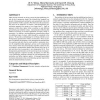Free Online Productivity Tools
i2Speak
i2Symbol
i2OCR
iTex2Img
iWeb2Print
iWeb2Shot
i2Type
iPdf2Split
iPdf2Merge
i2Bopomofo
i2Arabic
i2Style
i2Image
i2PDF
iLatex2Rtf
Sci2ools
145
click to vote
SIGMOD
2010
ACM
2010
ACM
Non-homogeneous generalization in privacy preserving data publishing
Most previous research on privacy-preserving data publishing, based on the k-anonymity model, has followed the simplistic approach of homogeneously giving the same generalized value in all quasi-identifiers within a partition. We observe that the anonymization error can be reduced if we follow a non-homogeneous generalization approach for groups of size larger than k. Such an approach would allow tuples within a partition to take different generalized quasi-identifier values. Anonymization following this model is not trivial, as its direct application can easily violate kanonymity. In addition, non-homogeneous generalization allows for additional types of attack, which should be considered in the process. We provide a methodology for verifying whether a nonhomogeneous generalization violates k-anonymity. Then, we propose a technique that generates a non-homogeneous generalization for a partition and show that its result satisfies k-anonymity, however by straightforwardly applying it, ...
Database | Non-homogeneous Generalization | Non-homogeneous Generalization Approach | Nonhomogeneous Generalization | SIGMOD 2010 |
Related Content
| Added | 06 Dec 2010 |
| Updated | 06 Dec 2010 |
| Type | Conference |
| Year | 2010 |
| Where | SIGMOD |
| Authors | Wai Kit Wong, Nikos Mamoulis, David Wai-Lok Cheung |
Comments (0)

